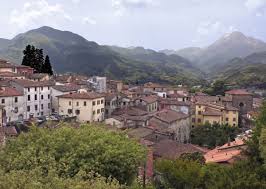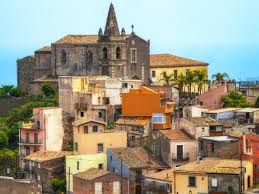Italy: Is Venice sinking?
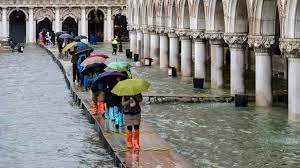
Venice: It is beautiful to describe Venice, one of Italy’s favorite travel destinations. Many have called it the “Floating City.” And for good reason.
One of the most attractive destinations on the planet, to any onlooker, appears to be floating. How Venice was built on water is a subject that fascinates and intrigues in equal measure. Yet, going by several predictions, Venice, Italy, is sinking—and has been for a while now.
Maybe it’s time to call one of the most magical cities on the planet—not the Floating City,” but the “Sinking City.” Of course, regardless of the season or whether there are crowds, Venice will always be worth a visit. And it’s not just because of its surreal beauty. One will find many enjoyable things to do in the “City of Canals.” That’s the reason the news of its sinking is both perplexing and disheartening. Here’s what we know about this ‘sinking city’ as of now.
Although there are many projects in place to protect this Italian gem, at the end of it all: it’s up to Mother Nature. Stay dry, Venice!
Brace for this. The news that Venice is sinking is not something new. It’s certainly not something we’ve learned this year or this decade. No, not even in this century. Actually, the news that Venice is sinking is as old as the city itself. But it was always nothing to worry about. Certainly, none that would cause alarm. It was associated with the occasional floods that would inundate the city every once in a while. Of course, it has to do with how one of the most gorgeous cities in Italy was built.
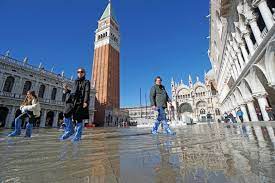
Constructed on a lagoon at sea level and supported by thousands, perhaps millions, of massive tree trunks, the city has always been exposed to the flooding risk that comes with high tides. However, previously, these floods were rare and far between. To compound the problem, there were no reliable records of the city’s sea levels.
Record keeping of the city’s sea levels would commence in 1872. Some records say much later. However, what is certain is that sometime in the middle of the 20th century, authorities realized that Venice was sinking. The finger of blame was pointed at the many artesian wells that had been sunk in hopes of solving the perennial freshwater problem the city had been grappling with. These wells created subterranean voids that the unsteady ground of the city sunk into by some inches.
Venice is sinking because it is surrounded by water, and too much weight from buildings has caused the ground it sits on the lower.
With increasing global temperatures, sea levels rising also impacts the city greatly.
Plate tectonics are also to blame for Venice’s sinking.
Quite a number of theories have been put forward to try to explain why Venice has been sinking. Of course, the very first theory was that of the artesian wells. These wells had been commissioned by the city’s authorities to help supply fresh water to the city’s thirsty residents. Of course, Venice has always been surrounded by water. However, this is not fresh water but salty water from the Mediterranean Sea. Of course, this venture was abandoned in the 1960s with the realization that the city was sinking. Since then, other theories have been put forward.
There has been the global warming theory. Scientists say that as a consequence of global warming, the global average sea levels have been on the rise. For instance, the average sea level in Venice is today 32 centimeters higher than it was in 1872—and 61 centimeters higher than it was in the 1750s. And while projections are many and varied, a report suggests that sea levels in Venice could go up by between 17 and 120 centimeters at the turn of the century. Global warming has also been blamed for the frequent flooding Venice experiences today.
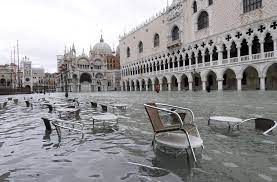
And again, another cause is attributed to plate tectonics. The City of Canals, it appears, is on the Adriatic plate. According to geoscientists, the Adriatic plate subduct beneath the Apennines Mountains —an event that causes the city and its environs to drop slightly.
Many climate experts suggest that Venice could sink by 2100. With many projects going on around and in Venice, these could potentially slow the progression of the water infiltrating this Italian city.
Although the exact timeframe of Venice’s sinking isn’t set in stone, many climate experts suggest the city could sink by 2100. Of course, it can be tricky to perfectly time when sea levels will rise enough to overtake the city, especially with the Mose Project and other infrastructure the country continues to invest in. Venice, Italy, is one of the world’s most beautiful places, so protecting it is a top concern for local, state, and European officials.
One thing to remember, however, is that Venice does currently “sink” during the annual Acqua Alta: typically between October and March. Many iconic landmarks regularly see water levels rise, pouring the nearby sea into the halls of churches, local businesses, and homes. Venice isn’t technically underwater, but during some times of the year: it does get a taste of the future. This has understandably concerned many residents and tourists, so it’s better to come here when the Acqua Alta is finished in April.
Defensive barriers have been installed throughout and around Venice to block flooding.
The Mose Project is expected to finalize in 2023, totaling 78 barriers in the water surrounding Venice, Italy.
If reports are to go by, quite a number of cities are actually in the process of sinking and going out of existence. Many of these cities may even sink before Venice. Venice may even be saved if efforts to halt its demise bear fruit. Authorities have toyed with several options. These include laying large amounts of concrete into the foundations of the city and deepening underwater channels. However, the only solution, of course, which is still underway, is the construction of defensive barriers to cordon off the vulnerable lagoon in times of flooding.

The defensive barriers, 78 in number, each of which is 20 meters wide, will rise up to block the incoming tide in the lagoon when waters reach a predetermined level. First conceptualized in 1992, this mobile gates project is known as the Mose (Experimental Electromechanical Module) project.
When Is The Mose Project To Save Venice From Sinking Expected To Be Completed? The Mose Project is expected to be completed by the end of 2023.
Whether the Mose project is going to arrest the demise of one of the most celebrated cities in the world remains to be seen. What is certain is that visiting Venice was never more urgent.


